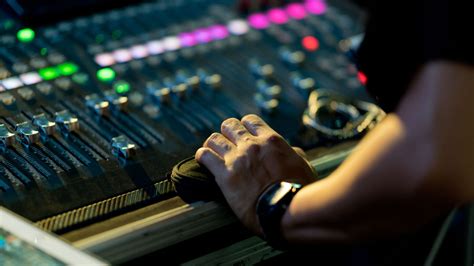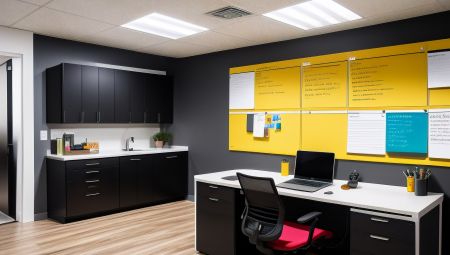Are you fascinated by the world of sound? Do you have a keen ear for music and a passion for the technical aspects of audio production? If so, then a career in audio engineering might be the perfect fit for you. In this blog post, we will explore the exciting and dynamic field of audio engineering, covering everything from the basics of what audio engineering is to the impact it has across a range of industries. We will delve into the role of an audio engineer, the importance of sound quality, and the tools and equipment used in this field. Additionally, we will discuss the steps to achieve a professional sound mix, the career opportunities available, and the common challenges faced by audio engineers. Join us as we unravel the future of audio engineering and explore the emerging trends in this ever-evolving industry. Whether you’re a budding audio enthusiast or a seasoned professional, there’s something for everyone in the realm of audio engineering.
Table of Contents
What is audio engineering?
Audio engineering is a branch of engineering dealing with the recording, mixing, and reproduction of sound. It involves the use of various technologies and techniques to capture, edit, and manipulate audio signals. Audio engineers work in a wide range of industries, including music production, film and television, radio broadcasting, video games, and live events.
One of the key aspects of audio engineering is the understanding of acoustics and sound waves. This involves knowledge of how sound behaves in different environments, how it can be manipulated using different tools and equipment, and how it can be optimized for various purposes.
Audio engineers use a variety of tools and equipment in their work, including microphones, mixing consoles, digital audio workstations, and software plugins. They also need to have a good ear for sound and be able to make critical judgments about the quality of the audio they are working with.
The role of an audio engineer is to bring together technical expertise and creative vision to create high-quality audio products. This can involve working with musicians and artists to capture the perfect sound, or collaborating with filmmakers and sound designers to create immersive and impactful audio experiences.
The role of an audio engineer
As an audio engineer, the primary role is to manage and manipulate sound through various technical equipment and software. This involves recording, editing, mixing, and reproducing sound to deliver the best audio quality possible.
Audio engineers also work closely with musicians, producers, and other industry professionals to understand their creative vision and translate it into a professional sound mix.
Furthermore, their role extends to troubleshooting technical issues, selecting the right equipment for a specific project, and ensuring that the final product meets industry standards.
Overall, the role of an audio engineer is essential in capturing and enhancing the auditory experience across various media platforms, including music, film, television, and live events.
The importance of sound quality
Sound quality is a crucial aspect of any audio production. Whether it’s music, film, video games, or live events, the quality of the sound can make or break the experience for the audience. The perception of the sound, its clarity and depth, has a direct impact on how the content is received by the listeners. Poor sound quality can lead to disengagement and a negative experience, while good sound quality enhances the overall satisfaction of the audience.
One of the main reasons why sound quality is so important is its ability to convey emotions and messages. A piece of music or a film soundtrack can evoke powerful emotions, and the quality of the sound plays a crucial role in delivering these emotions to the audience. Whether it’s the soft, soothing sound of a piano or the booming roar of an explosion in an action movie, the quality of the sound is what brings these moments to life and makes them impactful.
Another important aspect of sound quality is its contribution to the overall experience of the audience. When the sound is clear, balanced, and well-defined, it adds a layer of authenticity to the content. On the other hand, poor sound quality can be distracting and take away from the immersive nature of the experience. For example, in a live concert, a distorted or muddy sound can detract from the performance and diminish the enjoyment of the audience.
Furthermore, in professional settings such as studios or production houses, sound quality is paramount for maintaining high standards of professionalism. Whether it’s recording, mixing, or mastering audio, the final product must meet a certain level of quality to be considered professional and marketable. This is especially crucial in today’s competitive industry, where consumers have access to a wide range of high-quality content, and the expectations for sound quality are higher than ever.
Understanding acoustics and sound waves
Acoustics is the study of sound, and in the field of audio engineering, understanding acoustics and sound waves is crucial to achieving a professional sound mix.
Sound waves travel through the air in the form of vibrations, and these vibrations interact with the environment they pass through, such as walls, floors, and ceilings. Understanding how sound waves interact with the physical environment is essential in creating a balanced and high-quality sound.
Acoustics also involves the study of how sound is perceived by humans, including factors such as pitch, loudness, and timbre. An audio engineer must have a deep understanding of these concepts to create sound that is pleasing to the human ear.
Furthermore, a thorough understanding of acoustics and sound waves allows audio engineers to make informed decisions when setting up recording spaces, choosing equipment, and implementing sound treatment solutions to achieve the desired sound outcome.
Equipment and tools used in audio engineering
Audio engineering involves the use of specialized equipment and tools to capture, process, and manipulate sound. The microphone is one of the most essential tools used in audio engineering, as it is the first point of input for capturing sound. There are various types of microphones, including dynamic, condenser, and ribbon microphones, each with its own unique characteristics and uses.
Another crucial piece of equipment is the audio interface, which serves as the bridge between the analog and digital domains. This device converts analog signals from microphones and instruments into digital data that can be processed and edited on a computer. It also provides connections for studio monitors and headphones, allowing engineers to monitor the audio output in real time.
Furthermore, audio engineers rely on digital audio workstations (DAWs) to record, edit, and mix sound. These software applications provide a wide range of tools and plugins for processing audio, including equalizers, compressors, reverbs, and delays. DAWs also enable engineers to arrange and manipulate audio tracks, making them an indispensable tool in the audio production process.
Other essential tools used in audio engineering include studio monitors for accurate playback, mixing consoles for combining and controlling audio signals, and a variety of outboard gear such as preamps, compressors, and equalizers for shaping the sound. These tools, along with others like instruments, amplifiers, and cables, form the foundation of an audio engineer’s toolkit.
Steps to achieve a professional sound mix
When striving to achieve a professional sound mix, the first step is to ensure that you have high-quality audio recordings. This means using good microphones, preamps, and recording techniques to capture a clean and full sound. It’s essential to start with the best possible raw audio to work with.
Next, careful attention should be paid to the balance and panning of each sound element within the mix. This involves adjusting the volume levels of different audio tracks and positioning them within the stereo field to create a sense of space and depth.
Another crucial step in achieving a professional sound mix is equalization. This involves using EQ to adjust the frequency content of each track, cutting out unwanted frequencies and enhancing the desirable ones to create a balanced and cohesive overall sound.
Lastly, compression and dynamics processing play a key role in achieving a polished sound mix. By using compressors and other dynamic processing tools, audio engineers can control the dynamic range of each track, ensuring that the quieter and louder parts of the mix are brought closer together, resulting in a more consistent and pleasing sound.
The impact of audio engineering in different industries
Audio engineering plays a crucial role in various industries, impacting the way we experience sound in our daily lives. From entertainment to healthcare, the influence of audio engineering is far-reaching and continues to evolve with technological advancements.
In the entertainment industry, audio engineering is essential for creating high-quality music, film, and television productions. Sound engineers work behind the scenes to ensure that the audio elements of these projects meet industry standards and enhance the overall audience experience. Without skilled audio engineers, the quality of our favorite songs, movies, and shows would be compromised.
Furthermore, audio engineering has significant implications in the gaming industry. With the rise of virtual reality and immersive gaming experiences, sound design and engineering have become essential components in creating realistic and engaging gameplay. Audio engineers are tasked with creating dynamic soundscapes that enhance the gaming experience and further immerse players in a virtual world.
Outside of the entertainment sector, audio engineering also plays a critical role in healthcare and communications. From medical device development to telecommunication systems, audio engineering is integral in creating clear, accurate, and reliable sound transmission. In the healthcare industry, audio engineers contribute to the design and implementation of hearing aids, medical imaging systems, and diagnostic equipment, ultimately improving the quality of patient care.
Career opportunities in audio engineering
Audio engineering is a field that offers a wide range of career opportunities for those who are passionate about working with sound. Whether you are interested in music production, live sound engineering, post-production for film and television, or even video game audio, there are numerous paths you can take within the field of audio engineering.
One of the most common career paths for audio engineers is working in a recording studio. This can involve recording and mixing music for artists, bands, and other clients. Additionally, audio engineers can find opportunities in the live sound industry, working on concerts, events, and tours. There are also opportunities in post-production, where audio engineers work on sound design, editing, and mixing for film, television, and other forms of media.
Another avenue for audio engineers is to work in the video game industry, where they can be responsible for creating and implementing sound effects, music, and dialogue into games. Additionally, there are opportunities in the field of acoustic consulting, where audio engineers work on designing and optimizing sound systems for various spaces such as theaters, concert halls, and commercial buildings.
With the continuous advancement of technology, there are also opportunities for audio engineers in the fields of virtual reality and immersive audio experiences. This includes creating spatial audio for VR experiences, 360-degree videos, and augmented reality applications.
Common challenges faced by audio engineers
One of the common challenges faced by audio engineers is dealing with technical issues in the studio. This could range from malfunctioning equipment to compatibility issues with new software or tools. Finding quick and effective solutions to these problems is crucial in ensuring a smooth recording or production process.
Another challenge is managing client expectations and preferences. Sometimes, clients may have unrealistic demands or a specific vision that may not be easily achievable. It takes effective communication and negotiation skills to navigate these situations and find a balance between the client’s vision and what is technically feasible.
Working under pressure is also a common challenge for audio engineers. Whether it’s meeting tight deadlines or handling high-stress recording sessions, the ability to stay focused and deliver high-quality work under pressure is a crucial skill for professionals in this field.
Finally, staying updated with technological advancements and industry trends is a constant challenge for audio engineers. With new tools, software, and techniques emerging regularly, it’s important for professionals to be proactive in their continuing education and skill development to stay competitive in the industry.
The future of audio engineering and emerging trends
As we look ahead to the future of audio engineering, it is clear that technology will continue to play a major role in shaping the industry. With the rise of virtual reality, augmented reality, and 3D audio, audio engineers are facing new and exciting challenges. These emerging trends are pushing the boundaries of what is possible in audio production and creating new opportunities for those in the field.
Another important trend in the future of audio engineering is the continued focus on sustainability and environmental responsibility. As the world becomes more aware of the environmental impact of industries, audio engineers are finding ways to reduce their carbon footprint and minimize waste in the production process.
Furthermore, the future of audio engineering will likely see an increased emphasis on immersive audio experiences. From spatial audio to binaural recording, the demand for more realistic and immersive soundscapes is on the rise. This trend will require audio engineers to stay up-to-date with the latest technologies and techniques to create truly immersive experiences for their audiences.
Overall, the future of audio engineering is an exciting and rapidly evolving landscape. With new technologies and trends on the horizon, audio engineers will need to adapt and innovate to stay ahead in the industry.





